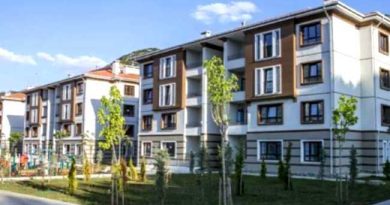News Scan, 8th Feb: Pressure grows for President Gul to be more assertive
Pressure grows for Gul to be more assertive
As the critical local elections in Turkey near, planned for the end of March, the rumor mill concerning the presidential elections — which are next in line this year after the local elections — has started gathering speed. As far as the public is concerned, there currently appear to be two viable candidates for president, namely Prime Minister Recep Tayyip Erdogan and the incumbent Abdullah Gul.
Erdogan clearly wants the job, but remains circumspect when asked about his candidacy. Members of his Justice and Development Party (AKP) however spell it out unequivocally. Huseyin Celik, the AKP’s deputy head and the party’s spokesman, for example, went on record once again recently saying categorically, “Our Prime Minister Recep Tayyip Erdogan is the No. 1 candidate for president.”
Meanwhile, the AKP has also been pushing to introduce constitutional changes that would transform Turkey from a parliamentary to a presidential system. The AKP, however, is not interested in a US-style system with its checks and balances.
It wants an unencumbered system that would in effect give the president absolute power.
Read more: http://www.al-monitor.com/pulse/originals/2014/02/turkey-gul-erdogan-presidency-elections-future-akp.html
Opposition calls on Turkish President Gül to veto law on Internet
Turkey’s opposition parties have called on President Abdullah Gül to veto a controversial Internet law, while the international community has also raised concerns over freedoms and rights in the country.
Main opposition Republican People’s Party (CHP) leader Kemal Kılıçdaroğlu demanded Feb. 7 that Gül veto the controversial Internet bill, which was approved by Parliament early on Feb. 6.
“The president should take up a position on behalf of democracy and freedom. The impartiality of the president means something different,” Kılıçdaroğlu told reporters in Istanbul on Feb. 7. “To say that ‘regulations against laws come and I sign them despite clearly [problems with them]’ degrades the office of the president. The president pledges loyalty to the Constitution. And he has to do what is necessary. A president cannot defend bans. A president cannot defend legal regulations which were brought by a government saying they will limit freedom,” he said according to the Doğan news agency.
HURRIYET DAILY NEWS
Interior Ministry document shows Zeynalov deported over critical tweets
A document released by the Interior Ministry on Tuesday proves that the decision to deport Mahir Zeynalov, a Today’s Zaman journalist and blogger, was made over tweets Zeynalov posted that were deemed too critical of the government, refuting another document issued by the ministry on Friday which says the journalist was ordered to leave as the result of the expiration of his residence permit.
The Interior Ministry document Today’s Zaman obtained was dated Feb. 4 and states that the Prime Ministry’s Coordination Center (BİMER) demanded the deportation or exclusion of Azerbaijani national Mahir Zeynalov for his “statements that are contrary to fact” and “against the state and government.”
The Interior Ministry found it appropriate to deport Zeynalov over his tweets, sent from the @MahirZeynalov_ account and targeting high-level state officials, the document states and adds: “As a result of this, a foreign national named Mahir Zeynalov, born on … and a citizen of Azerbaijan, in accordance with an order issued by the [interior] ministry dated Feb. 4, 2014, and Article 8 of Law No. 5682, has been included in the ‘Foreign nationals whose entry into our country [Turkey] has been barred’ category.”
TODAYS ZAMAN
The Turkish government and (UNDP) to cooperate to improve Turkey’s capacity in disaster recovery and emergency relief
A protocol was signed between Turkey’s Disaster and Emergency Relief Agency (AFAD) and the UNDP to collaborate on disaster risk reduction and emergency relief operations. Turkey suffered from various disasters in the past 60 years. Almost 35,000 lives were lost due to earthquakes alone, with economic loss amounting to three percent of Turkey’s general national product (GNP) the last 60 years.
Disaster recovery and reducing disaster risk are major factors in Turkey’s development. The protocol prepared jointly by UNDP and AFAD aims to increase exchange of information, experience and knowledge on disaster management, including the use of state-of-the-art technology. The cooperation between the two agencies will mostly focus on disaster management, disaster risk reduction, early warning and early recovery systems. Further, the response to the Syria crisis is another matter covered by the protocol.
The U.N. also has a 2005-2015 framework action plan for risk mitigation in disaster management. AFAD’s 2013-2017 strategic plan aims to “building a disaster resilient society.” The Partnership Framework Agreement against signed between the UNDP and Turkey on March, 2011 also covers disaster risk reduction.
SABAH
Turkish-Italian collaboration to harness Turkey’s geothermal potential
Turkey’s vastly underutilized geothermal energy sources are entering into the focus of foreign investors. A letter of intent signed between Turkey’s Sun Group and Japanese-owned Italian manufacturer of Organic Rankine Cycle turbines Turboden envisages the development of two geothermal sites in Turkey’s Aegean provinces of Canakkale and Manisa.
Inked at the Turkey-Italy Economic Forum held in Rome during Turkish President Abdullah Gul’s visit to the country, the deal involves the planning, investment and technology transfer between companies to build two 100-megawatt (MW) geothermal power plants in the said regions at a total cost of EUR 300 million.
“Turkey is among the leading countries in the world in terms of geothermal potential; however, the utilization of geothermal resources to generate electricity is just beginning to take off. Incentives provided by our government in this regard are instrumental in harnessing this renewable and domestic energy source..”, said a statement from the Sun Group about the deal. Sun Group company Yeni Basak Enerji holds three geothermal drilling licenses in Canakkale and one in Manisa.
STAR
Turkey’s first nuke plant ‘facing further delays’
Turkish authorities’ request for review of a key environmental report will likely cause further delay of construction of the first nuclear plant in the country, that will be built by Russian Rosatom
Turkey’s first nuclear power plant has hit further delays that will push back the start of production by almost a year after Turkish authorities requested resubmission of an environmental report, industry sources and experts said.
Russia’s Rosatom is building the first four nuclear reactors for energy-hungry Turkey, which has embarked on an ambitious nuclear program led by the government, to reduce its $60 billion annual energy import bill.
The CEO of Akkuyu NGS, the project company set up by Russia’s Rosatom, said in October that the project was going to be operational by mid-2020, a delay of about 18 months from the initial start-up date. However now, even that schedule looks to be too optimistic, with energy officials and experts predicting a further delay of 10-12 months.
HURRIYET DAILY NEWS
08.02.2014
This is a news-scan from major Turkish papers and internet sites. However, we do not verify above stories neither do we vouch for their accuracy.





